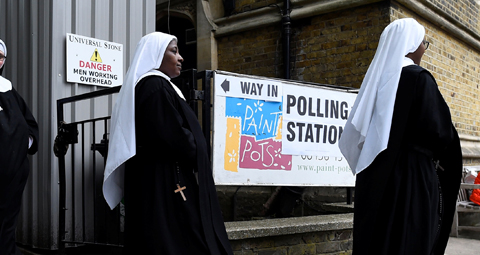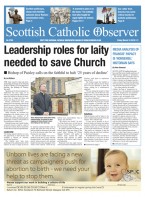March 2 | ![]() 0 COMMENTS
0 COMMENTS ![]() print
print

Safe in whose hands? A look at what Scotland’s political parties think of Catholic schools
In a special report, Ryan McDougall examines the position of Scotland’s political leaders on Catholic education, 100 years after it won state funding
Last year, the SNP MP Tommy Sheppard, tipped as a favourite to be the new deputy leader of his party, said at a Humanist Society Scotland event that he wanted to ‘chip away’ at the ‘power of organised religion’ in schools, a remark that was branded ‘chillingly intolerant’ by the Catholic Church. Yet most of the major parties in Scotland claim to support Catholic schools.
This weekend, First Minister Nicola Sturgeon will deliver the Cardinal Winning Lecture. Ahead of her speech the SCO investigated Scotland’s main political parties to gauge just how far they support Catholic education in principle and in practice.
Scottish National Party
Tommy Sheppard’s comments, exposed in the SCO, were widely condemned and the SNP-led Scottish Government made it clear they did not agree with his position. Despite labelling the SCO’s report ‘fake news,’ Mr Sheppard added in an online blog post on his website that ‘Catholic schools exist and form an important part of our education system.’
His initial comment does not necessarily reflect the feelings towards Catholic education throughout the rest of the SNP. In 2015, in the lead-up to that year’s general election, the SCO spoke to Scottish party leaders.
Nicola Sturgeon told the SCO: “I am very supportive of state-funded Catholic schools, they perform very well. I have no plans to change the status quo on Catholic schools.” In 2016, the current education secretary, John Swinney, told us: “I have visited many Catholic schools where I have been incredibly impressed by the relentless efforts of teachers and headteachers to deliver excellence and equity in Scottish education.”
The SNP had historically been treated with scepticism by many Catholics, largely due to the anti-Catholic views of former leader William Wolfe.
However, in recent decades the party has made an effort to reach out to the Catholic community, and the pages of the SCO through the 1990s were filled with comments from former leader Alex Salmond supporting Catholic schools.
Asked about their position on Catholic schools for this article, the SNP said: “Catholic schools, along with many others across Scotland, are benefiting from the funding we have allocated to closing the attainment gap.
“We see Catholic schools as an important and valuable part of Scotland’s educational mix.
“They do fantastic work day in, day out in providing our children with an excellent education and supporting them to become active and concerned citizens.
“We’re determined to see the sector continue to play a full part in Scotland’s education system.”
Scottish Labour
THE Labour Party’s shadow education minister Iain Gray told us: “The Labour Party supports Catholic schools and recognises how important they are to so many families and communities across Scotland.
“In all walks of Scottish public life—from politics to sport, from law to academia, and from science to education—the positive influence of Catholic education is evident.”
In 2015, then-leader Jim Murphy told us: “This is not up for discussion: Faith-based education in Scotland is a permanent commitment for me.”
Mr Murphy’s spell as head of the Scottish Labour Party proved to be short-lived. In the upheaval from the party’s significant loss in the 2015 general election, the Labour Party struggled with leadership, with Richard Leonard taking over as party leader in 2017. The SCO has been assured by several Labour MSPs that the new leader is supportive of Catholic schools.
Scottish Conservatives
In 2015, Scottish Conservatives leader Ruth Davidson was vocal about her support for state-funded Catholic schools in Scotland, as well as other faith schools. In an interview with the SCO, she said: “Many Catholic schools work because they have a distinct ethos. I would like to see this extended so that we have a much more vibrant education sector.”
Approached during Catholic Education Week, the party’s shadow education secretary, Liz Smith, told us: “The Scottish Conservatives fully support a diverse model for schools, including faith schools, many of which have demonstrated very high academic standards.
“We have repeatedly backed the role of Catholic schools in Scotland, and will continue to do so vigorously in the Scottish Parliament.”
Scottish Green Party
THE Scottish Green Party shows little support for Catholic schools. It’s no secret that the Scottish Greens wish to end state-funded Catholic education. Their joint convener, Patrick Harvie, once told the SCO that ‘the Greens support an integrated secular education system,’ and that ‘children have the right to a neutral education.’
Their party policy towards faith schools states: “No publicly-funded school shall be run by a religious organisation. Schools may teach about religions, comparing examples which originated in each continent, but are prohibited from delivering religious instruction in any form or encouraging adherence to any particular religious belief.”
While the Greens’ policy also states they will cater for the rights for pupils to practice their faith in schools through the likes of prayer spaces, they also state that they would ‘abolish the requirement for a compulsory daily act of worship.’
In 2016, we reported that Mr Harvie’s fellow co-convener Maggie Chapman stated that denominational schools could ‘reinforce’ sectarianism, despite the Scottish Government’s advisory group on tackling sectarianism stressing several times that Catholic schools are not at all to blame.
Despite the party’s policy, they left their views on faith schools out of their 2016 manifesto.
Scottish Greens MSP Ross Greer, their education spokesperson, told us: “We believe in a secular Scotland where those of all faiths and none are equally respected and afforded equal opportunity.
“Core to that belief is a secular state and education system. At present, in non-denominational as well as faith schools, institutional privileges are afforded to certain faith groups. All of our faith communities play a role in enriching Scotland’s national story every day. Together we can work towards a modern, secular society where all are valued equally.”
Scottish Liberal Democrats
DESPITE repeated attempts to contact the Scottish Liberal Democrats through their media office and education spokesman Tavish Scott, the SCO received no reply.
However, the party’s current president, Councillor Eileen McCartin, said: “Catholic education in Scotland is very important to the whole education provision in Scotland.”
A practising Catholic, Ms McCartin said the schools achieve high standards in poor communities, and condemned the ‘constant attack on Catholic education by the Scottish Secular Society and their friends.’
“Catholic education is quality education, and it’s here to stay, as long as the Catholic communities want them,” she said.
However, Michael Ryan, a member of the Liberal Democrats from 1988 to 2005, and a member of the Liberal Party before that, told the SCO recently that the Liberal Democrats ‘as a whole are fundamentally opposed to denominational schools on principle.’
He added: “The Liberal Democrats as a party are mainly dominated by people with a secular, humanist outlook. They do not take kindly to anything to do with religion.”
He said in 1993 the Lib Dems passed a motion which said: “Conference believes that the existence of separate schools for different religious groups is a major cause of religious and racial intolerance [and] an unnecessary expense.”
In 2015, Lib Dem leader Willie Rennie told us: “I think Catholic schools do a pretty good job. Would I have started from where we are at now? No, the whole two-pronged education situation in Scotland isn’t ideal. But the Church made a great contribution to Scottish society, often at times when the state could not. This has left us with a mixed education system. But if it works, why change it?”











